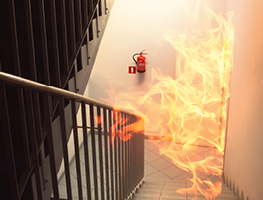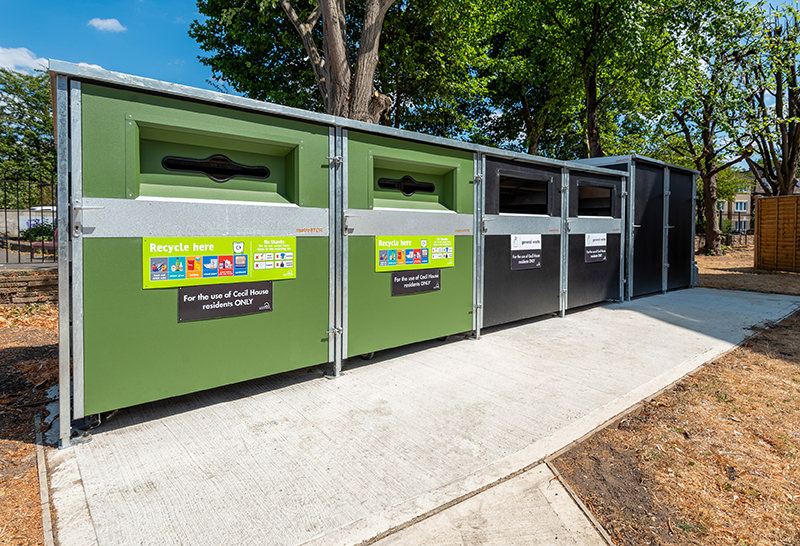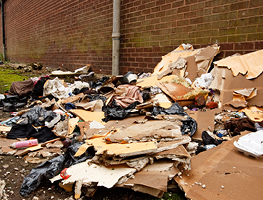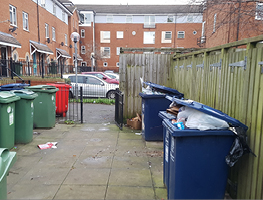Every year, there are in excess of 30,000 refuse-related fire incidents attended by Fire & Rescue Services across the UK. Most waste materials can ignite easily and wheelie bin fires, in particular, can be devastating.
Fly-tipped bulky waste can be a ready source of fuel for arson, and, if an incident occurs close to a building, there is a very real risk of the fire penetrating the building, with damage to the property, injuries, and ultimately even fatalities possible consequences.
Difficulties for Communal Environments
For bulky waste items, a trip to the local Household Waste Recycling Centre (HWRC) is typically the most practical solution for effective disposal. In the absence of a personal vehicle, however, and depending on the size of the item in question, households are required to rely on council collections, where the service criteria is dependent on users storing their bulky waste items on the street to await collection.
For communal buildings with a lack of secure external space for short-term storage this can be very restrictive. Combined with the fees involved in this service, it’s often easier to anonymously dump the items outside the building or in communal bin areas, which then become fire hazards in themselves and potentially create hot spots for arson and anti-social behaviour. Some Council Waste Strategies now include a recommendation that every new development includes a provision for the short-term storage of bulky waste.
Safety Steps and Best Practice Measures
London Fire Brigade report that there are on average over 3,000 deliberate fires every year in London, and actively encourages people to report fly tipping to help prevent deliberate fires. Household waste, often constituting bulky waste items, accounted for almost ⅔ of all fly-tipping incidents reported to local authorities in 2021/22.
Reducing these alarming statistics requires a collective effort between households, landlords and local authorities. As a primary action, following safety steps and enforcing best practice measures is a key to reducing the fire risks associated with fly tipping and bulky waste.
- Never leave bulky waste in communal spaces such as corridors, stairwells, or blocking fire escape routes.
- Avoid disposing of hazardous and flammable waste through regular disposal methods in order to restrict arson opportunities. Instead, seek local specialist disposal services.
- Ensuring communal bin stores are secure and well lit restricts fly tipping opportunities. Installing security systems such as CCTV, alarms and security lighting are effective precautionary measures to deter illegal dumping by reinforcing accountability.
- Educational campaigns help to inform individuals about proper bulky waste disposal methods to raise awareness over the fire-risks involved with fly tipping, while the recycling and reuse of bulky items can be promoted through donation or resale programs.
- Ensuring an adequate bin store capacity for all users is important to prevent side waste build up and fly tipping. Collaborating with local authorities to establish regular bulky waste collection days or more prominent and convenient drop-off points helps to maintain safety, improve access, and reduce fire risk.
Secure Containment for Bulky Waste
To reduce fly tipping and side waste build up, metroSTOR provides a range of bin stores and housings that ensure residents in communal environments have an effective means to better manage their household waste and recyclables.
Recommendations by the FPA and CFPA-E state that bins should not be stored within 6 metres of any building opening and secured in place. metroSTOR products are designed to secure waste and recycling bins away from dwellings, achieving an essential reduction in fire risk, and, in the event this cannot be achieved due to site constraints, the risk can be reduced by specifying cladding materials to provide 30 minutes fire resistance.
Options to specify metroSTOR PTM Outdoor Storage Units as bulky waste stores enable short-term storage of items awaiting collection. Establishing secure containment for bulky items has been found to reduce fly-tipping and fire risk, while making it easier to separate items that may be suitable for reuse.
Depending on the individual circumstances on each estate, access can be controlled by landlords, or by issuing residents with one-time access codes via an online platform. This can be key to reducing overall disposal costs and ensuring resident and building safety.








